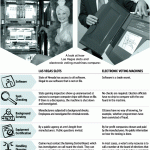An interesting new report has come out of an organisation calling itself the Common Information Environment, which describes itself thus:
The Common Information Environment (CIE) is a group of significant public sector stakeholders working together to deliver information, services, and empowerment across a range of sectors in order to meet the cross-domain real world needs of the citizens of the UK, both now and in the future.
The list of participating organisations is fairly impressive, both in weightyness and buzzword factor – including the British Library, the UK e-Science Core Programme, the BBC and the Cabinet Office e-Government Unit amongst others.
The report they’ve just announced and published here (PDF) with Appendices (also PDF) focuses on the possibilities for the official use of Creative Commons licenses in the UK public sector and their conclusions and recommendations are encouraging at first glance (I’ve not read the whole thing yet!).
For instance, they say:
The study concluded that many resources produced by CIE organisations could be made available under a common licence and that Creative Commons would allow a substantial amount of CIE resources to be made available for reuse. Other existing common licences, such as Creative Archive and Click-Use could be used if Creative Commons cannot be applied but their use should be minimised to avoid removing many of the key benefits of the Creative Commons Licences.
They also suggest the following set of principles that organisations should consider adopting:
- Resources should be made available for reuse unless there is a justifiable reason why they should not.
- The reuse of resources should be as unconstrained as possible. For example, resources should be made available for commercial reuse as well as non-commercial reuse wherever possible.
- The range of permitted uses of resources should be as wide as possible, for example, including the right to modify the resource and produce derivative works from it.
- Reuse should be encouraged by permitting others to redistribute resources on a world-wide basis.
- Resources should be made directly available and discoverable electronically whenever possible.
- The conditions of use for each resource should be linked directly to the resource so that they are reusable at the point of discovery.
Now that first point alone made me sit up and take notice. I remember back in my early days of working in the Civil Service in the UK where the responses I got from talking to other civil servants about whether they’d be making, for instance, map data available electronically was that the Tories felt that if people wanted it then it was worth charging for.
In other words, if you felt that something was worth making available for free then you had to argue your case. But in later years this did happen, witness the release around 2002 under a BSD license of the TenDRA ANDF compiler system, created originally by the group I started off my full-time working life for as a systems administrator.
Point 4 (“Reuse should be encouraged by permitting others to redistribute resources on a world-wide basis“) seems odd if you forget factor in that these organisations are funded by the UK tax payer, and this seems to be borne out by another odd line in the Executive Summary which says:
It was initially thought that the inability to restrict access to the UK when using Creative Commons licences would be a barrier to uptake. […] However, these issues were largely resolved during the study.
This appears to be summarising section 5.2.2 “Against” which says:
The question arose during workshop discussion of whether public sector organisation’s resources should be made available world-wide or restricted to the UK and also within the UK (e.g. Scotland only if funded by the devolved Executive). While a first reaction was that the UK should benefit there was also a recognition that if resources were unrestricted then other countries could adopt the same approach and many more resources would be available. The view of most rights holders, as well as potential users, was that resources should be made available world-wide whenever possible.
It is very refreshing to see them recognise that if they opened up to the world it could encourage other countries to do the same, making a much richer cultural environment for all. They also eat their own dogfood, the report is released under a Creative Commons Attribution license. So, from my brief scan of the report it appears well researched and discussed and I find it encouraging, and is a nice complement to the uptake of OpenDocument format in Massachusetts.





